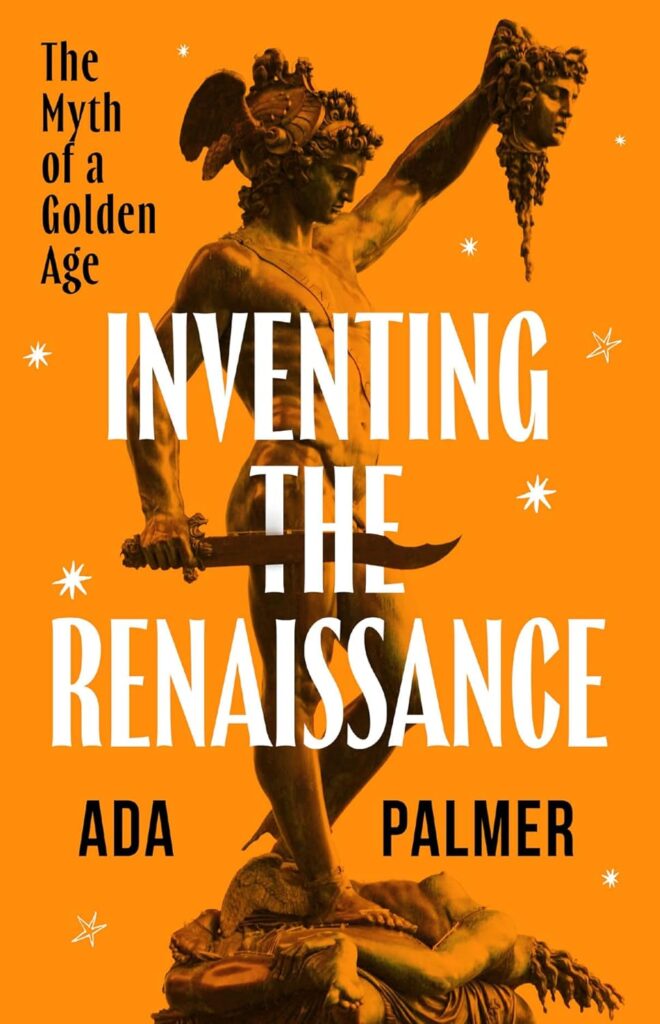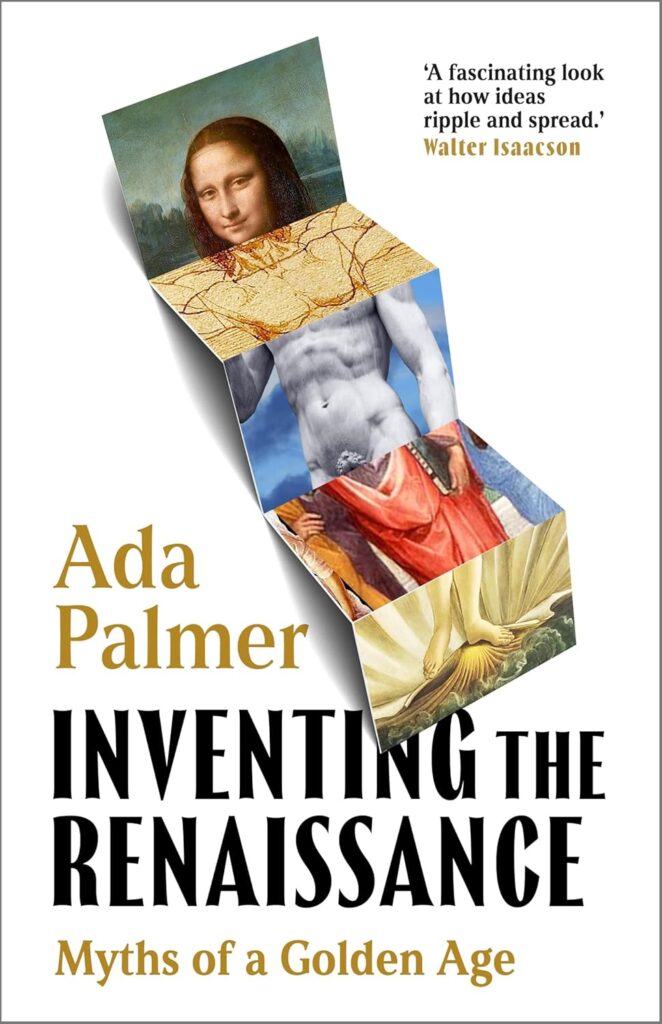Inventing the Renaissance (book) coming out!
It’s time at last. If you’ve enjoyed my ExUrbe blog posts and stories about history over the years, here’s the book-length version on its way! Inventing the Renaissance: the Myth of a Golden Age, coming out February 13th 2025 in the UK (pre-order through Amazon.co.uk in hardcover, Kindle e-book or Audiobook) and March 21st in the USA (pre-order from Bookshop.org, Barnes & Noble, Amazon, or for Nook or Kindle), or it’s always best to order from your favorite independent bookshop!

Combining updated versions of some of my most popular blog series (including those on Machiavelli, the Black Death & Renaissance, the history of Progress, and history of atheism) with tons of new material , this fat and playful whopper of a book (how is it 768 pages?!) is packed with fun anecdotes and intimate details, weaving together the lives of fifteen different Renaissance figures, some famous, some obscure (entrepreneurs, musicians, artists, heretics, princesses, assassins, prophets) to look at where the myth of a bad Middle Ages and golden Renaissance came from, a story partly about the period and equally about the centuries since, and the many political movements that have found it useful to claim a supposed golden age.
OFFICIAL DESCRIPTION OF THE BOOK (more of my own comments below):
The Renaissance is one of the most studied and celebrated eras of history. Spanning the end of the Middle Ages to the beginning of modernity, it has come to symbolise the transformative rebirth of knowledge, art, culture and political thought in Europe. And for the last two hundred years, historians have struggled to describe what makes this famous golden age unique.
In Inventing the Renaissance, acclaimed historian Ada Palmer provides a fresh perspective on what makes this epoch so captivating. Her witty and irreverent journey through the fantasies historians have constructed about the period show how its legend derives more from later centuries’ mythmaking than from the often-grim reality of the period itself. She examines its defining figures and movements: the enduring legacy of Niccolò Machiavelli, the rediscovery of the classics, the rise of the Medici and fall of the Borgias, the astonishing artistic achievements of Michelangelo, Leonardo, and Cellini, the impact of the Inquisition, and the expansion of secular Humanism. Palmer also explores the ties between culture and money: books, for example, could cost as much as grand houses, so the period’s innovative thinkers could only thrive with the help of the super-rich. She offers fifteen provocative and entertaining character portraits of Renaissance men and women, some famous, some obscure, whose intersecting lives show how the real Renaissance was more unexpected, more international, and above all more desperate than its golden reputation suggests.
Drawing on her popular blogs and writing with her characteristic energy and wit, Palmer presents the Renaissance as we have never seen it before. Colloquial, funny and brilliant, this is a work of deep scholarship that will make you alternately laugh and cry.

I started writing Inventing the Renaissance in summer 2020, as a response to how constantly reporters were asking “If the Black Death caused the Renaissance, will COVID cause an economic boom?” It’s a question founded on such profoundly distorted assumptions, I realized I couldn’t give it a short answer, a real answer required pulling back the curtain on the great and terrible Renaissance and exposing the awkward, often scared and desperate truth behind the curtain. And it took three parts:
- Establishing that there is no such thing as a golden age or dark age, but why the myth of dark and golden ages has been hard to wipe out because it’s so convenient for later generations, who want to use it to claim that their policy/party/movement/etc. will bring about a golden age (and to paint their rivals as the corresponding dark age).
- What actually caused the production of all the shiny art and architecture which makes us think the Renaissance was a golden age, but was actually born from a desperate reality.
- How historical change actually works, and how examining the past shows us we can never sit back and think “Well, X has happened, it will cause a golden age,” since good outcomes in history are real, but are only caused by one thing: people working hard to make it so.
The project took a long time, and ended up incorporating a ton of new material, centering on a set of fifteen mini-biographies of Renaissance figures whose paths crossed in this fascinating but desperate time, many kinds of people: a banker, a musician, an assassin, a poet, two prophets, two princesses, some heretics, ending up with our friend Machiavelli and his hard work to protect Florence during this desperate age. It’s a unique structure for a history, often retelling the same set of events several times but from different points of view, drawing on my skills as a novelist to tell stories full of passion and bias, and then to upend and invert them by suddenly switching to another point of view on the opposite side of the conflict, or zooming out to look at the different historians who have told contradictory versions of the tale.
When I sent the (very fat, very long!) manuscript off to the press I kept expecting them to tell me to cut it, separate it into different things, but my editors said they just love the way the whole thing flows, weaving together many stories, not just of the Renaissance but later eras, and drawing back the veil on historians and the work we do in inventing history, showing, with more candor than books usually do, the messy underbelly of the historian’s craft, “how the sausage gets made” so to speak. It’s a big book but a surprisingly fast read for its length, full of warmth and intimacy as well as humor and adventure, treating historical figures as friends we meet across the diaspora of time, and history-making as a long, multigenerational collaboration where even the errors are often a fruitful and vital part of getting to better truths beyond. It doesn’t read like most histories, but it does a lot, and, as my editors said, it ended up making them feel hopeful for our present in a way that can be rare in our desperate times.
So I hope you’ll give it a try, and enjoy sharing this taste of the Renaissance world that I’ve been living with so intimately with over my years getting to know our friends in the past, who worked so hard, and left us – not the world they wanted to make – but a world very worth having.
ORDER LINKS:
- February 13th 2025 in the UK (pre-order through Amazon.co.uk in hardcover, Kindle e-book or Audiobook)
- March 21st in the USA (pre-order from Bookshop.org, Barnes & Noble, Amazon, or for Nook or Kindle)
But remember, it’s always best to order from your favorite independent bookshop! If you pre-order a book they’ll notice, and they might order an extra one; that makes the biggest difference of all!
3 Responses to “Inventing the Renaissance (book) coming out!”
-
Yippee! I pre-ordered from my local indie store before I even read the article. So excited! Will be hawking this book to everyone I know. Best wishes for 2025, Ada!
-
Yay, thank you! So excited to share my funny fat orange little guy with the world!
-
-
Any chance of an audiobook version?


